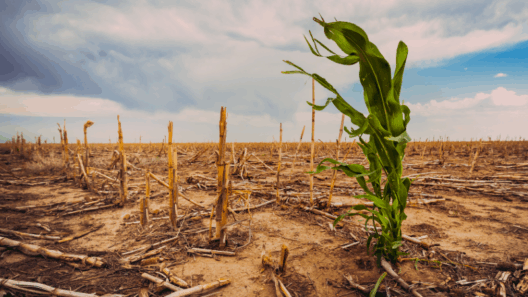As the temperature of our planet continues to rise, the specter of global warming looms larger each day. With 2020s data showcasing unprecedented weather phenomena, from devastating wildfires to record-breaking hurricanes, the imperative to address climate change has never been more pressing. The question, however, must be asked: are we too late in our attempts to combat this cataclysmic issue? This inquiry encapsulates not only our fascination with the environment but also the depth of our engagement with a contemporary crisis that calls for immediate action.
It is crucial first to understand the origins of global warming. The Industrial Revolution heralded a significant transformation in human society, characterized by the extensive use of fossil fuels. Carbon emissions surged, accumulating greenhouse gases in the atmosphere and leading to an increase in global temperatures. This alteration in the Earth’s climate system has far-reaching consequences, threatening biodiversity, food security, and human health.
In recent years, various global initiatives have emerged in response to this existential threat. One significant accomplishment is the Paris Agreement, which aims to limit global warming to well below 2 degrees Celsius, ideally to 1.5 degrees Celsius above pre-industrial levels. This landmark treaty underscores the collective effort of nations to transition toward more sustainable practices. However, despite its ambitious goals, critiques abound regarding the efficacy of this agreement in achieving its targets. The political will to implement necessary changes often falters when confronted with economic pressures.
The complexity of international cooperation complicates the fight against global warming. Countries possess varying amounts of wealth, technological advancement, and natural resources, which makes uniform progress challenging. While wealthier nations may be able to invest in renewable energy technologies, developing countries often prioritize economic growth. This creates a dichotomy where mitigation and adaptation strategies vary significantly across the globe, leading to skepticism regarding a truly unified global response.
Moreover, the oft-cited notion of “too late” carries with it a disheartening weight. It suggests a resignation to the inevitability of climate disasters, a sentiment echoed by some climate scientists and activists. However, this perspective begs for scrutiny. Recent research indicates that while we may have passed certain critical thresholds, it does not negate the possibility of curative measures. The concept of climate resilience emerges as a beacon of hope, advocating for adaptation strategies that could help communities withstand the inevitable impacts of climate change.
On a grassroots level, many communities worldwide have begun implementing localized solutions. These innovations range from urban green spaces that mitigate city heat to regenerative agricultural practices aimed at improving soil health. Communities are recognized as vital players in the climate change narrative, capable of driving change beyond governmental proclamations. The rise of environmental activism, particularly among the youth, has reinvigorated efforts to address climate issues at both local and global levels. This activism is marked by a palpable urgency and the innovative deployment of social media to galvanize support and inspire action.
Economically, there’s a burgeoning recognition of the need for a just transition towards a low-carbon economy. Transitioning to renewable energy sources can generate employment opportunities and stimulate economic growth. Yet, there remains a paradox where investments in fossil fuels continue to overshadow sustainability initiatives. Understanding the true cost of inaction regarding climate change is essential; the longer the delay, the more catastrophic the consequences will be. Economists increasingly advocate for a carbon price, aiming to internalize the externalities associated with greenhouse gas emissions and propel the transition to sustainable energy.
Technological advancements play an instrumental role in the narrative surrounding climate change. Innovations in solar energy, wind power, and electric vehicles have the potential to revolutionize the energy sector. Moreover, emerging technologies such as carbon capture and storage offer tantalizing possibilities for mitigating the impacts of emissions. However, dependence on technology as a panacea harbors its own risks, such as misallocation of resources and creatures of distraction from necessary systemic changes. Moreover, these technologies must be complemented by robust policy frameworks and public engagement to be effective.
Education remains a pivotal component of the fight against global warming. A well-informed populace is crucial for nurturing the political will required to enact substantial change. Climate literacy empowers individuals to advocate for sustainable practices while also holding corporations and governments accountable. Schools, universities, and media platforms must prioritize the dissemination of knowledge related to climate science, sustainability, and environmental stewardship. This cultural shift is instrumental in generating a broader understanding of the interconnectedness of human actions and environmental outcomes.
The narrative of hopelessness and despair is detrimental to the very fabric of efforts aimed at mitigating climate change. Instead, a reframing towards optimism and action-oriented solutions could invigorate a collective sense of purpose. While it is critical to confront the harsh realities of global warming, it is equally vital to harness the potential for human ingenuity and cooperation. By fostering a culture of innovation and resilience through global collaboration, education, and grassroots activism, the world might not be too late after all.
In conclusion, while the challenges posed by global warming are daunting, they serve as a call to action rather than a fatalistic declaration. The convergence of political, social, and technological forces holds the promise of creating a sustainable future. As we navigate this complex landscape, the shared responsibility of individuals, communities, and nations remains paramount in this global endeavor. The clock is ticking, but it is not beyond the realms of possibility to ignite a transformative movement that could redefine our relationship with the planet for generations to come.








